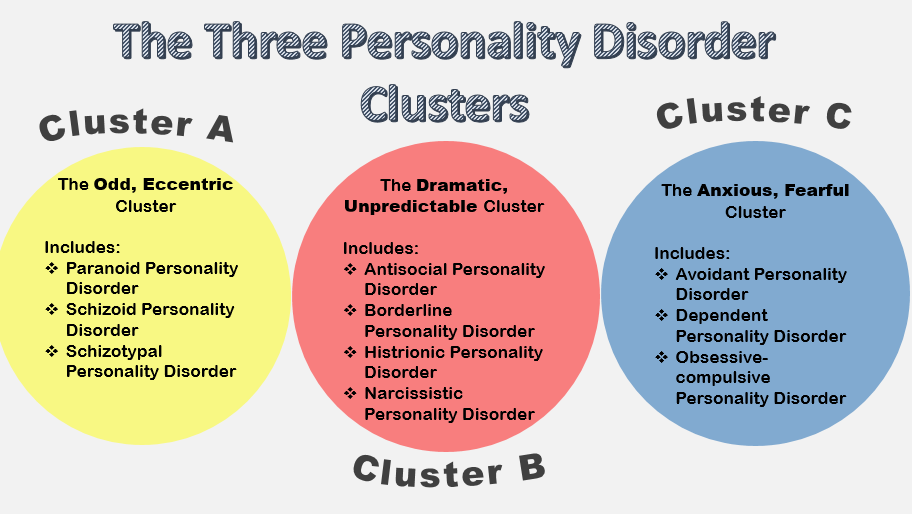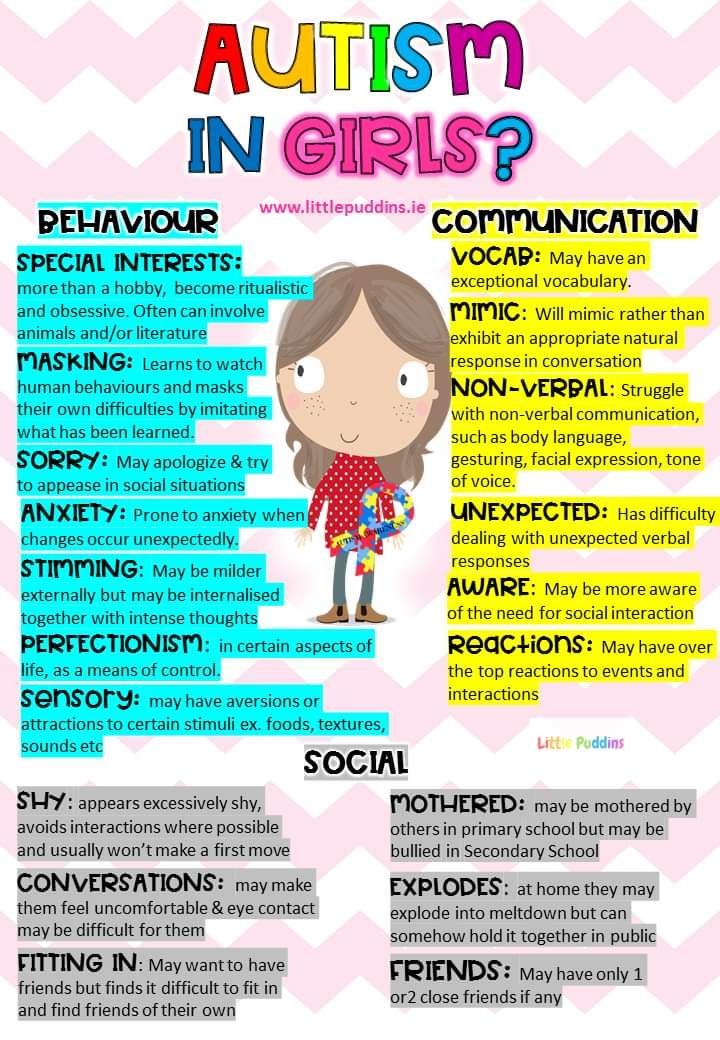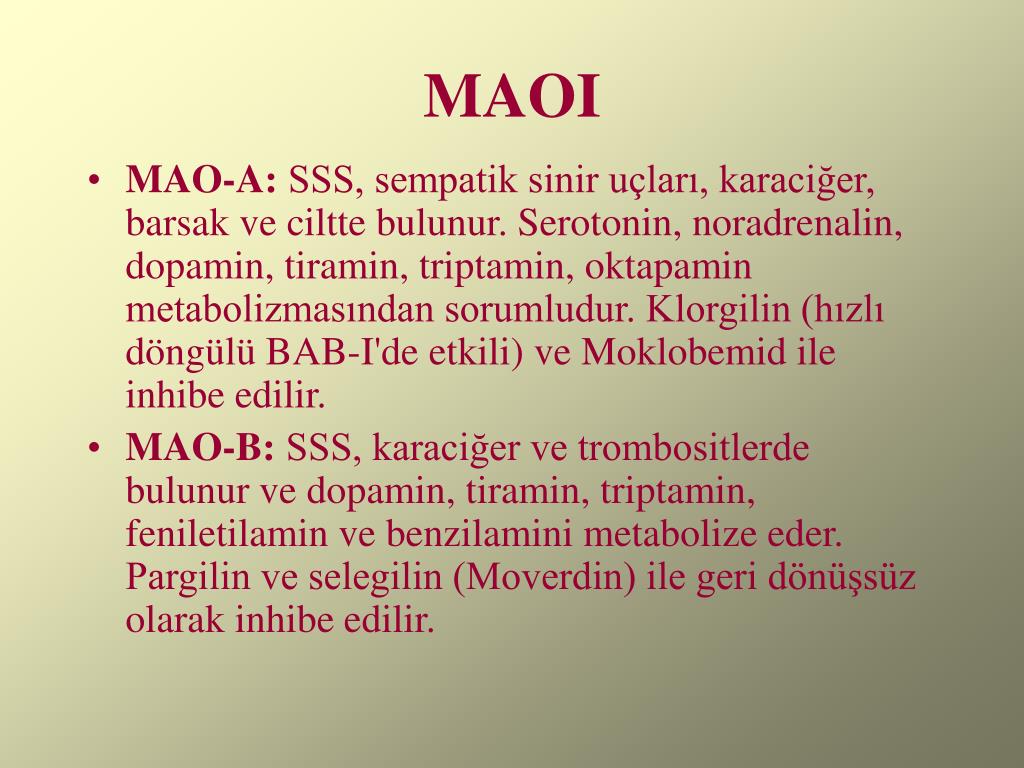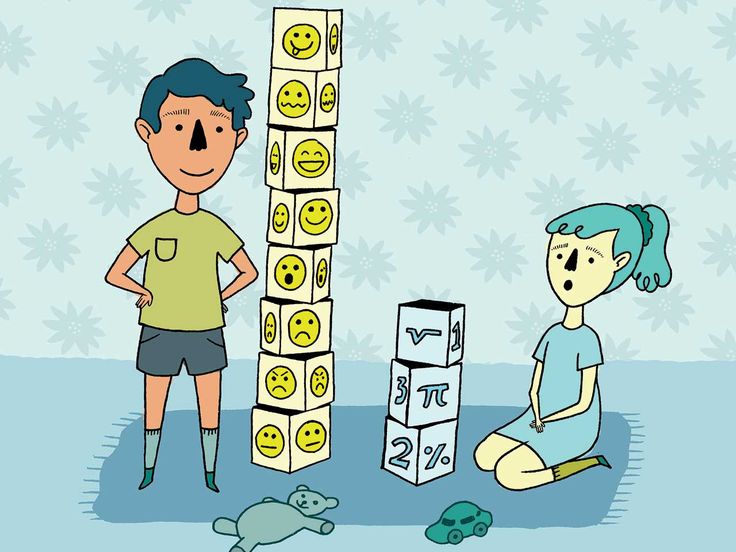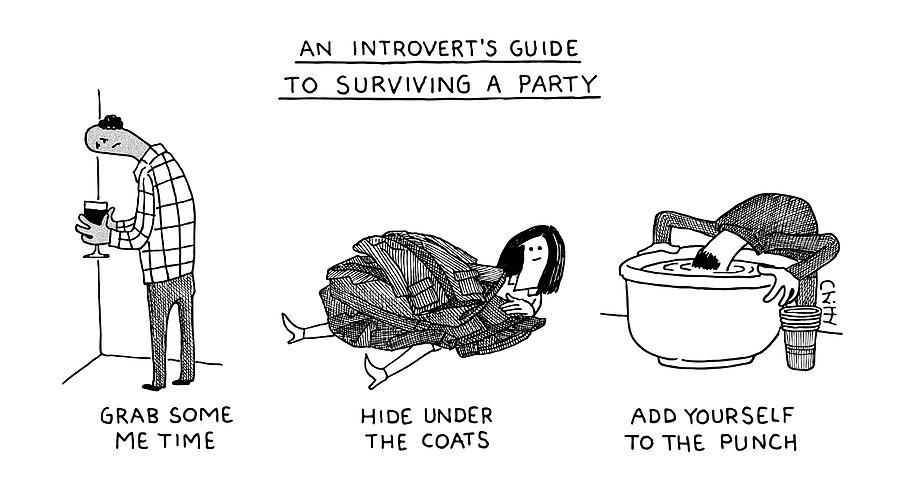Dsm cluster b
DSM-5: The Ten Personality Disorders: Cluster B
- Antisocial Personality Disorder
- Histrionic Personality Disorder
- Narcissistic Personality Disorder
- Borderline Personality Disorder
Cluster B is called the dramatic, emotional, and erratic cluster. It includes:
- Borderline Personality Disorder.
- Narcissistic Personality Disorder.
- Histrionic Personality Disorder.
- Antisocial Personality Disorder.
Disorders in this cluster share problems with impulse control and emotional regulation.
The Antisocial Personality Disorder* is characterized by a pervasive pattern of disregard for the rights of other people
that often manifests as hostility and/or aggression. Deceit and manipulation are also central features.
In many cases hostile-aggressive and deceitful behaviors may first appear during childhood.
- These children may hurt or torment animals or people.
- They may engage in hostile acts such as bullying or intimidating others.
- They may have a reckless disregard for property such as setting fires.
- They often engage in deceit, theft, and other serious violations of standard rules of conduct.
- When this is the case, Conduct Disorder (a juvenile form of Antisocial Personality Disorder) may be an appropriate diagnosis.
- Conduct Disorder is often considered the precursor to an Antisocial Personality Disorder.
In addition to reckless disregard for others, they often place themselves in dangerous or risky situations.
They frequently act on impulsive urges without considering the consequences. This difficulty with impulse control results in loss of employment, accidents, legal difficulties, and incarceration.
Persons with Antisocial Personality Disorder typically do not experience genuine remorse for the harm they cause others. However, they can become quite adept at feigning remorse when it is in their best interest to do so (such as when standing before a judge).
However, they can become quite adept at feigning remorse when it is in their best interest to do so (such as when standing before a judge).
They take little to no responsibility for their actions. In fact, they will often blame their victims for "causing" their wrong actions, or deserving of their fate. The aggressive features of this personality disorder make it stand out among other personality disorders as individuals with this disorder take a unique toll on society.
Histrionic Personality Disorder
Persons with Histrionic Personality Disorder* are characterized by a pattern of excessive emotionality and attention seeking. Their lives are full of drama (so-called "drama queens"). They are uncomfortable in situations where they are not the center of attention.
- People with this disorder are often quite flirtatious or seductive
, and like to dress in a manner that draws attention to them.
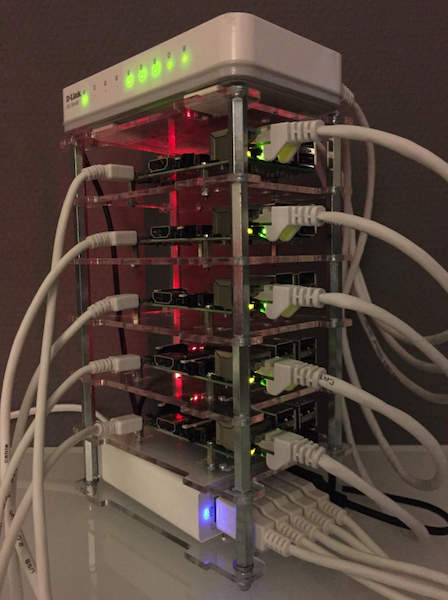
- They can be flamboyant and theatrical, exhibiting an exaggerated degree of emotional expression.
- Yet simultaneously, their emotional expression is vague, shallow, and lacking in detail. This gives them the appearance of being disingenuous and insincere.
- Moreover, the drama and exaggerated emotional expression often embarrasses friends and acquaintances as they may embrace even casual acquaintances with excessive ardor, or may sob uncontrollably over some minor sentimentality.
People with Histrionic Personality Disorder can appear flighty and fickle. Their behavioral style often gets in the way of truly intimate relationships, but it is also the case that they are uncomfortable being alone.
They tend to feel depressed when they are not the center of attention. When they are in relationships, they often imagine relationships to be more intimate in nature than they actually are.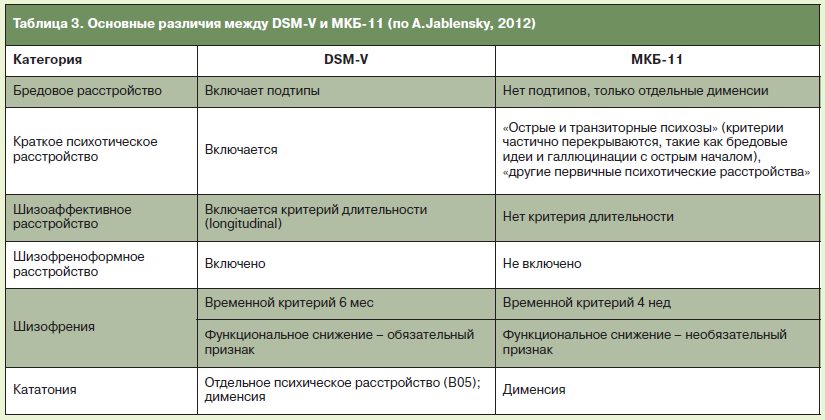
People with Histrionic Personality Disorder tend to be suggestible; that is, they are easily influenced by other people's suggestions and opinions. A literary character that exemplifies the Histrionic Personality Disorder is the character of Blanche DuBois in Tennessee William's classic play, "Streetcar Named Desire."
Narcissistic Personality Disorder
People with Narcissistic Personality Disorder* have significant problems with their sense of self-worth stemming from a powerful sense of entitlement. This leads them to believe they deserve special treatment, and to assume they have special powers, are uniquely talented, or that they are especially brilliant or attractive. Their sense of entitlement can lead them to act in ways that fundamentally disregard and disrespect the worth of those around them.
- People with Narcissistic Personality Disorder are preoccupied with fantasies of unlimited success and power, so much so that they might end up getting lost in their daydreams while they
fantasize about their superior intelligence or stunning beauty.
- These people can get so caught up in their fantasies that they don't put any effort into their daily life and don't direct their energies toward accomplishing their goals.
- They may believe that they are special and deserve special treatment, and may display an attitude that is arrogant and haughty.
- This can create a lot of conflict with other people who feel exploited and who dislike being treated in a condescending fashion.
- People with Narcissistic Personality Disorder often feel devastated when they realize that they have normal, average human limitations; that they are not as special as they think, or that others don't admire them as much as they would like.
- These realizations are often accompanied by feelings of intense anger or shame that they sometimes take out on other people.
- Their need to be powerful, and admired, coupled with a lack of empathy for others, makes for conflictual relationships that are often superficial and devoid of real intimacy and caring.
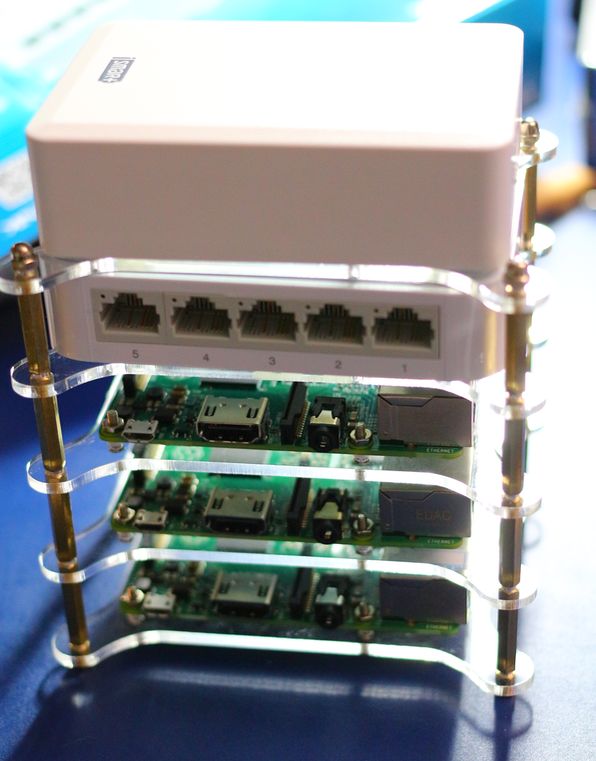
Status is very important to people with Narcissistic Personality Disorder. Associating with famous and special people provides them a sense of importance. These individuals can quickly shift from over-idealizing others to devaluing them.
However, the same is true of their self-judgments. They tend to vacillate between feeling like they have unlimited abilities, and then feeling deflated, worthless, and devastated when they encounter their normal, average human limitations. Despite their bravado, people with Narcissistic Personality Disorder require a lot of admiration from other people in order to bolster their own fragile self-esteem. They can be quite manipulative in extracting the necessary attention from those people around them.
Borderline Personality Disorder
Borderline Personality Disorder* is one of the most widely studied personality disorders. People with Borderline Personality Disorder tend to experience intense and unstable emotions and moods that can shift fairly quickly.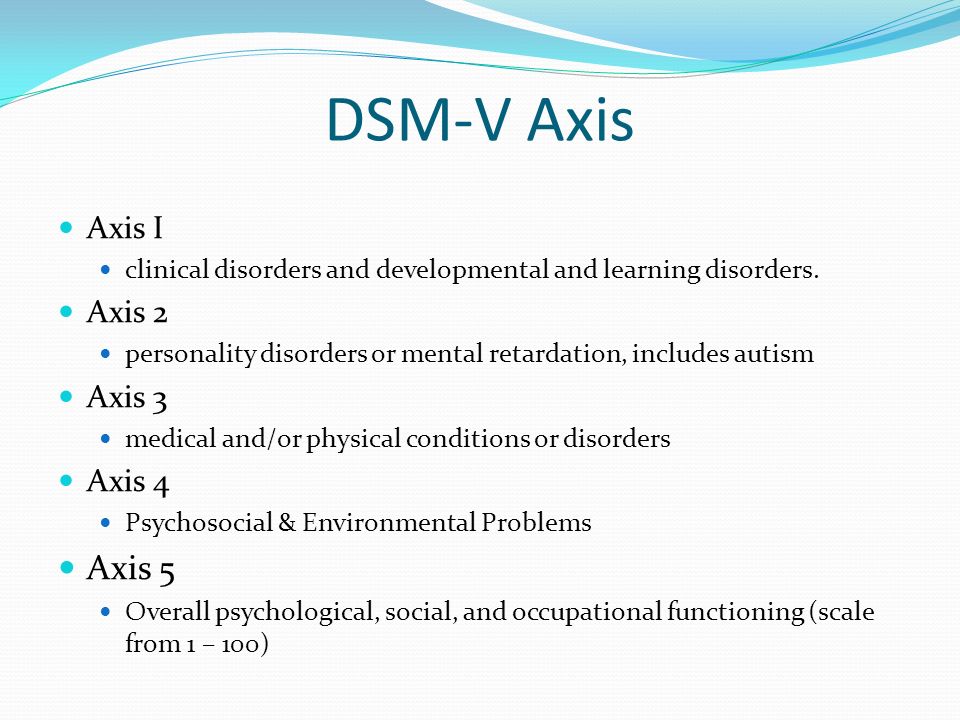 They generally have a hard time calming down once they have become upset. As a result, they frequently have angry outbursts and engage in impulsive behaviors such as substance abuse, risky sexual liaisons, self-injury, overspending, or binge eating. These behaviors often function to sooth them in the short-term, but harm them in the longer term.
They generally have a hard time calming down once they have become upset. As a result, they frequently have angry outbursts and engage in impulsive behaviors such as substance abuse, risky sexual liaisons, self-injury, overspending, or binge eating. These behaviors often function to sooth them in the short-term, but harm them in the longer term.
- People with Borderline Personality Disorder tend to see the world in polarized, over-simplified, all-or-nothing terms.
- They apply their harsh either/or judgments to others and to themselves and their perceptions of themselves and others may quickly vacillate back and forth between "all good" and "all bad."
- This tendency leads to an unstable sense of self, so that persons with this disorder tend to have a hard time being consistent.
- They can frequently change careers, relationships, life goals, or residences.
 Quite often these radical changes occur without any warning or advance preparation.
Quite often these radical changes occur without any warning or advance preparation.
Black-and-White Thinking and Emotion Dysregulation in Borderline Personality Disorder
People with Borderline Personality Disorder tend to view the world in terms of black-and-white, or all-or-nothing thinking. Their tendency to see the world in black-or-white (polarized) terms makes it easy for them to misinterpret the actions and motivations of others.
- These polarized thoughts about their relationships with others lead them to experience intense emotional reactions, which in turn interacts with their difficulties in regulating these intense emotions.
- The result is that they will characteristically experience great distress which they cannot easily control and may subsequently engage in self-destructive behaviors as they do their best to cope.
- The intensity of their emotions, coupled with their difficulty regulating these emotions, leads them to act impulsively.

To illustrate the way black-and-white thinking, emotional dys-regulation, and poor impulse regulation all merge and culminate to create interpersonal conflict and distress, let's use an example:
Suppose the partner of a woman with Borderline Personality Disorder fails to remember their anniversary. Black-and-white thinking causes her to conclude, "He doesn't love me anymore" and all-or-nothing thinking leads her to (falsely) conclude, "If he does not love me, then he must hate me."
Such thoughts would easily lead to some pretty intense emotions, such as feeling rejected, abandoned, sad, and angry. She has a hard time tolerating and dealing with these intense feelings and consequently becomes highly upset and overwhelmed. The intensity of her negative feelings seems unbearable.
Next she has a powerful impulse to "do something" just so that these feelings will go away. She might angrily accuse her partner of having an affair and she might plead with her partner not to leave her.

Meanwhile her partner is baffled by this extreme reaction, particularly since he is not having an affair, and he readily recalls all his other recent loving gestures. Her partner might also become angry at these wild accusations of infidelity and so the conflict escalates and things get more intense.
Alone after the fight, the woman feels overwhelming self-loathing or numbness and goes on to intentionally injure herself (by cutting or burning herself) as a way to cope with her numbness.
When her partner learns about this self-harm behavior he can't understand it and concludes he is being manipulated. He expresses his strong concern for her well-being but also his anger. In turn, she feels misunderstood.
Clearly, the Borderline Personality Disorder with its combination of distorted thought patterns, intense and under-regulated emotions, and poor impulse control is practically designed to wreak havoc on any interpersonal relationship.
Dialectical Behavior Therapy (DBT) Learn more about Dialectical Behavior Therapy for Borderline Personality Disorder
*It is important to remember that everyone can exhibit some of these personality traits from time to time. To meet the diagnostic requirement of a personality disorder, these traits must be inflexible; i.e., they can be regularly observed without regard to time, place, or circumstance.
Furthermore, these traits must cause functional impairment and/or subjective distress. Functional impairment means these traits interfere with a person's ability to functional well in society. The symptoms cause problems in interpersonal relationships; or at work, school, or home. Subjective distress means the person with a personality disorder may experience their symptoms as unwanted, harmful, painful, embarrassing, or otherwise cause them distress.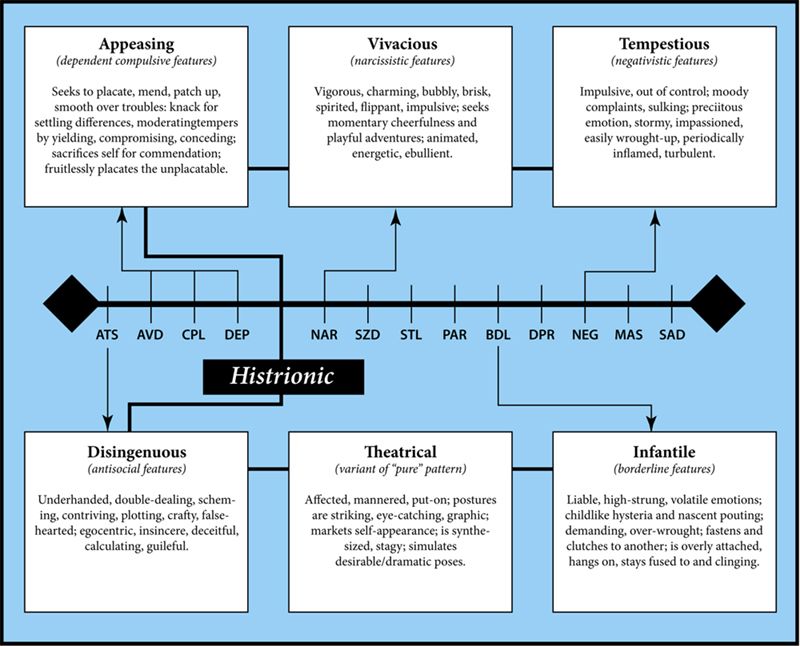 The above list only briefly summarizes these individual Cluster B personality disorders. Richer, more detailed descriptions of these disorders are found in the section describing the four core features of personality disorders.
The above list only briefly summarizes these individual Cluster B personality disorders. Richer, more detailed descriptions of these disorders are found in the section describing the four core features of personality disorders.
Personality disorders - Symptoms and causes
Overview
A personality disorder is a type of mental disorder in which you have a rigid and unhealthy pattern of thinking, functioning and behaving. A person with a personality disorder has trouble perceiving and relating to situations and people. This causes significant problems and limitations in relationships, social activities, work and school.
In some cases, you may not realize that you have a personality disorder because your way of thinking and behaving seems natural to you. And you may blame others for the challenges you face.
Personality disorders usually begin in the teenage years or early adulthood. There are many types of personality disorders. Some types may become less obvious throughout middle age.
Products & Services
- Book: Mayo Clinic Family Health Book, 5th Edition
- Newsletter: Mayo Clinic Health Letter — Digital Edition
Symptoms
Types of personality disorders are grouped into three clusters, based on similar characteristics and symptoms. Many people with one personality disorder also have signs and symptoms of at least one additional personality disorder. It's not necessary to exhibit all the signs and symptoms listed for a disorder to be diagnosed.
Cluster A personality disorders
Cluster A personality disorders are characterized by odd, eccentric thinking or behavior. They include paranoid personality disorder, schizoid personality disorder and schizotypal personality disorder.
Paranoid personality disorder
- Pervasive distrust and suspicion of others and their motives
- Unjustified belief that others are trying to harm or deceive you
- Unjustified suspicion of the loyalty or trustworthiness of others
- Hesitancy to confide in others due to unreasonable fear that others will use the information against you
- Perception of innocent remarks or nonthreatening situations as personal insults or attacks
- Angry or hostile reaction to perceived slights or insults
- Tendency to hold grudges
- Unjustified, recurrent suspicion that spouse or sexual partner is unfaithful
Schizoid personality disorder
- Lack of interest in social or personal relationships, preferring to be alone
- Limited range of emotional expression
- Inability to take pleasure in most activities
- Inability to pick up normal social cues
- Appearance of being cold or indifferent to others
- Little or no interest in having sex with another person
Schizotypal personality disorder
- Peculiar dress, thinking, beliefs, speech or behavior
- Odd perceptual experiences, such as hearing a voice whisper your name
- Flat emotions or inappropriate emotional responses
- Social anxiety and a lack of or discomfort with close relationships
- Indifferent, inappropriate or suspicious response to others
- "Magical thinking" — believing you can influence people and events with your thoughts
- Belief that certain casual incidents or events have hidden messages meant only for you
Cluster B personality disorders
Cluster B personality disorders are characterized by dramatic, overly emotional or unpredictable thinking or behavior. They include antisocial personality disorder, borderline personality disorder, histrionic personality disorder and narcissistic personality disorder.
They include antisocial personality disorder, borderline personality disorder, histrionic personality disorder and narcissistic personality disorder.
Antisocial personality disorder
- Disregard for others' needs or feelings
- Persistent lying, stealing, using aliases, conning others
- Recurring problems with the law
- Repeated violation of the rights of others
- Aggressive, often violent behavior
- Disregard for the safety of self or others
- Impulsive behavior
- Consistently irresponsible
- Lack of remorse for behavior
Borderline personality disorder
- Impulsive and risky behavior, such as having unsafe sex, gambling or binge eating
- Unstable or fragile self-image
- Unstable and intense relationships
- Up and down moods, often as a reaction to interpersonal stress
- Suicidal behavior or threats of self-injury
- Intense fear of being alone or abandoned
- Ongoing feelings of emptiness
- Frequent, intense displays of anger
- Stress-related paranoia that comes and goes
Histrionic personality disorder
- Constantly seeking attention
- Excessively emotional, dramatic or sexually provocative to gain attention
- Speaks dramatically with strong opinions, but few facts or details to back them up
- Easily influenced by others
- Shallow, rapidly changing emotions
- Excessive concern with physical appearance
- Thinks relationships with others are closer than they really are
Narcissistic personality disorder
- Belief that you're special and more important than others
- Fantasies about power, success and attractiveness
- Failure to recognize others' needs and feelings
- Exaggeration of achievements or talents
- Expectation of constant praise and admiration
- Arrogance
- Unreasonable expectations of favors and advantages, often taking advantage of others
- Envy of others or belief that others envy you
Cluster C personality disorders
Cluster C personality disorders are characterized by anxious, fearful thinking or behavior.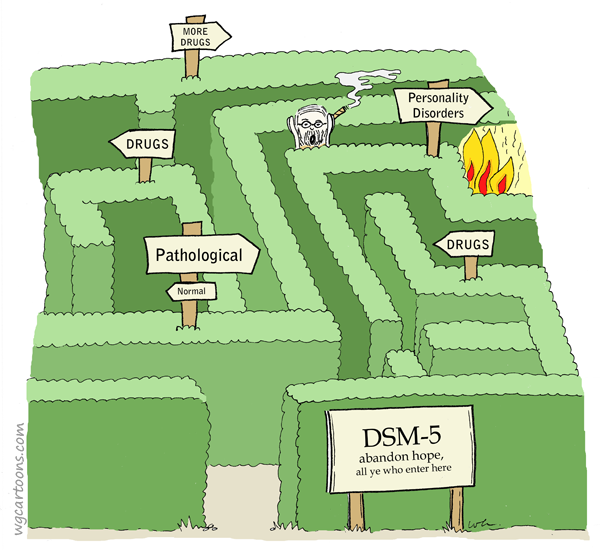 They include avoidant personality disorder, dependent personality disorder and obsessive-compulsive personality disorder.
They include avoidant personality disorder, dependent personality disorder and obsessive-compulsive personality disorder.
Avoidant personality disorder
- Too sensitive to criticism or rejection
- Feeling inadequate, inferior or unattractive
- Avoidance of work activities that require interpersonal contact
- Socially inhibited, timid and isolated, avoiding new activities or meeting strangers
- Extreme shyness in social situations and personal relationships
- Fear of disapproval, embarrassment or ridicule
Dependent personality disorder
- Excessive dependence on others and feeling the need to be taken care of
- Submissive or clingy behavior toward others
- Fear of having to provide self-care or fend for yourself if left alone
- Lack of self-confidence, requiring excessive advice and reassurance from others to make even small decisions
- Difficulty starting or doing projects on your own due to lack of self-confidence
- Difficulty disagreeing with others, fearing disapproval
- Tolerance of poor or abusive treatment, even when other options are available
- Urgent need to start a new relationship when a close one has ended
Obsessive-compulsive personality disorder
- Preoccupation with details, orderliness and rules
- Extreme perfectionism, resulting in dysfunction and distress when perfection is not achieved, such as feeling unable to finish a project because you don't meet your own strict standards
- Desire to be in control of people, tasks and situations, and inability to delegate tasks
- Neglect of friends and enjoyable activities because of excessive commitment to work or a project
- Inability to discard broken or worthless objects
- Rigid and stubborn
- Inflexible about morality, ethics or values
- Tight, miserly control over budgeting and spending money
Obsessive-compulsive personality disorder is not the same as obsessive-compulsive disorder, a type of anxiety disorder.
When to see a doctor
If you have any signs or symptoms of a personality disorder, see your doctor or other primary care professional or a mental health professional. Untreated, personality disorders can cause significant problems in your life that may get worse without treatment.
Request an Appointment at Mayo Clinic
From Mayo Clinic to your inbox
Sign up for free, and stay up to date on research advancements, health tips and current health topics, like COVID-19, plus expertise on managing health.
To provide you with the most relevant and helpful information, and understand which
information is beneficial, we may combine your email and website usage information with
other information we have about you. If you are a Mayo Clinic patient, this could
include protected health information. If we combine this information with your protected
health information, we will treat all of that information as protected health
information and will only use or disclose that information as set forth in our notice of
privacy practices. You may opt-out of email communications at any time by clicking on
the unsubscribe link in the e-mail.
You may opt-out of email communications at any time by clicking on
the unsubscribe link in the e-mail.
Causes
Personality is the combination of thoughts, emotions and behaviors that makes you unique. It's the way you view, understand and relate to the outside world, as well as how you see yourself. Personality forms during childhood, shaped through an interaction of:
- Your genes. Certain personality traits may be passed on to you by your parents through inherited genes. These traits are sometimes called your temperament.
- Your environment. This involves the surroundings you grew up in, events that occurred, and relationships with family members and others.
Personality disorders are thought to be caused by a combination of these genetic and environmental influences. Your genes may make you vulnerable to developing a personality disorder, and a life situation may trigger the actual development.
Risk factors
Although the precise cause of personality disorders is not known, certain factors seem to increase the risk of developing or triggering personality disorders, including:
- Family history of personality disorders or other mental illness
- Abusive, unstable or chaotic family life during childhood
- Being diagnosed with childhood conduct disorder
- Variations in brain chemistry and structure
Complications
Personality disorders can significantly disrupt the lives of both the affected person and those who care about that person. Personality disorders may cause problems with relationships, work or school, and can lead to social isolation or alcohol or drug abuse.
By Mayo Clinic Staff
Related
Associated Procedures
Products & Services
What are cluster B personality disorders?
Admin
Content
- Lines
- Antisocial personality disorder
- Borderline personality disorder
- Historical personality disorder
- Narcissical Disorders 9000 9000
- Psychotherapy
- Treatment
- Helping a loved one
- Outlook
- Suicide prevention
Overview
Personality disorders are types of mental disorders.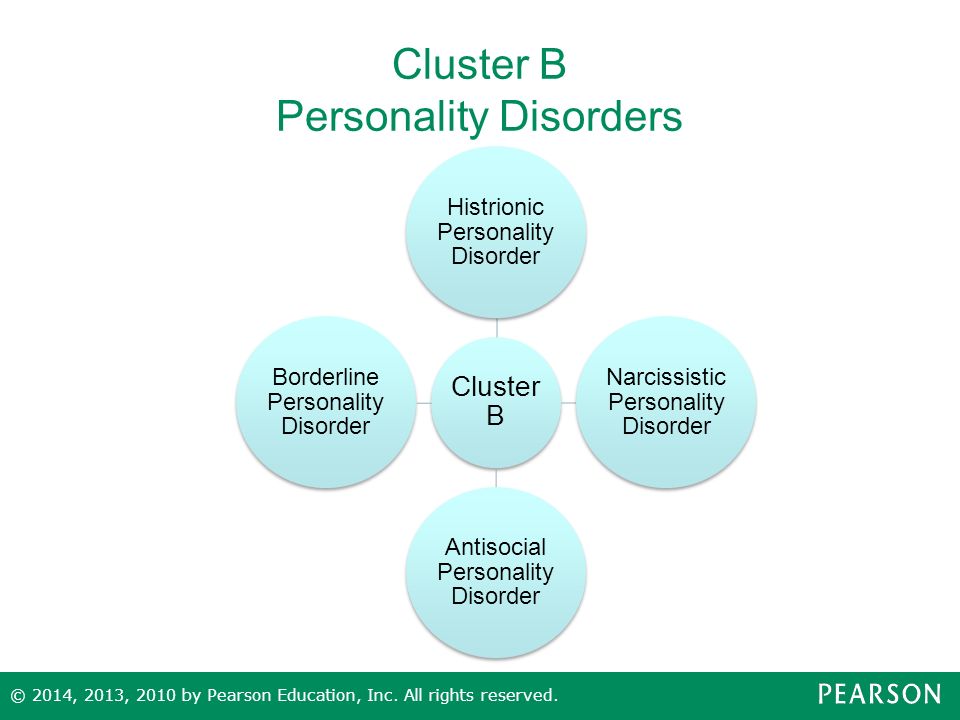 They can lead to permanent, long-term, and unhealthy patterns of thinking, feeling, and behaving.
They can lead to permanent, long-term, and unhealthy patterns of thinking, feeling, and behaving.
There are three main clusters of personality disorders: Cluster A, Cluster B, Cluster C.
Each cluster has several unique features that are used to classify symptoms. Within the three clusters, 10 personality disorders are grouped. Group B includes four personality disorders, including:
- antisocial personality disorder
- borderline personality disorder
- historical personality disorder
- narcissistic personality disorder
Personality disorders from different clusters can be diagnosed.
Traits
Each personality disorder has its own unique symptoms or traits. According to the fifth edition of the Diagnostic and Statistical Manual of Mental Disorders (DSM-5), symptoms should:
- have onset in adolescence or early adulthood
- be stable over time
- lead to distress or impairment of personality
antisocial personality disorder
People with antisocial personality disorder exhibit a pattern of neglect and violation of the rights of others.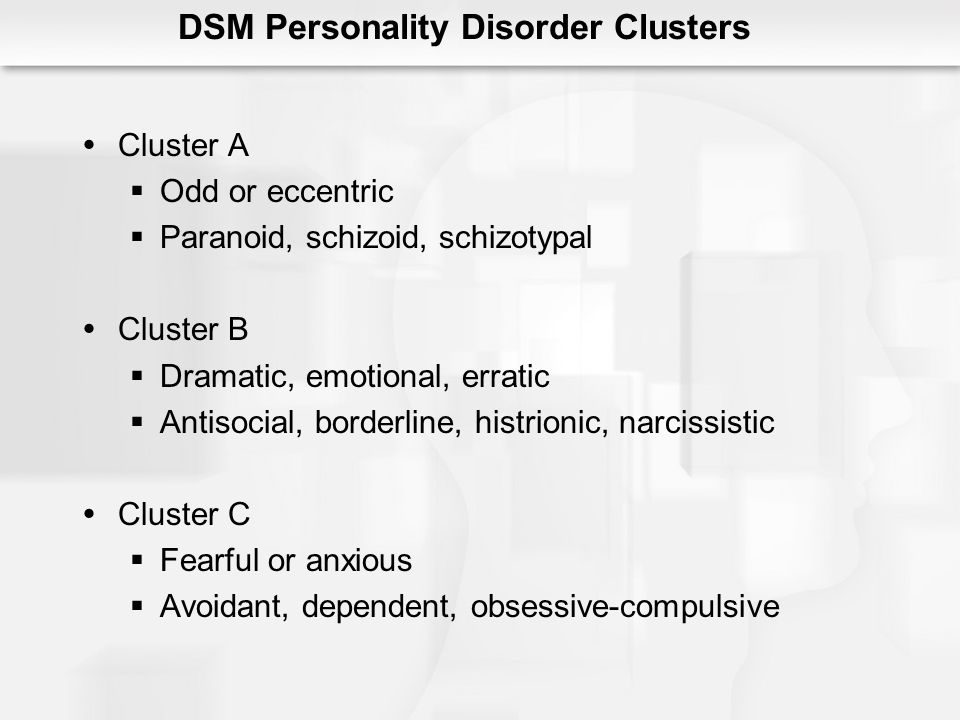 Deception and manipulation are used for personal gain. They may be rude to others, lie or cheat in order to reap these personal gains. They may also be more prone to stealing. However, as a rule, they do not repent of their deeds.
Deception and manipulation are used for personal gain. They may be rude to others, lie or cheat in order to reap these personal gains. They may also be more prone to stealing. However, as a rule, they do not repent of their deeds.
People with antisocial personality disorder also have an increased risk of drug or alcohol addiction.
Borderline personality disorder
People with borderline personality disorder often have unstable personal relationships. It can also affect how you feel about yourself. Symptoms include:
- impulsive behavior
- chronic feelings of emptiness
- chronic feelings of abandonment
- severe temper tantrums
- reckless behavior
People with this disorder may also exhibit suicidal behavior.
Read more: Please don't get me wrong, because I have borderline personality disorder »
Historical personality disorder
People with histrionic personality disorder often strive to be the center of attention.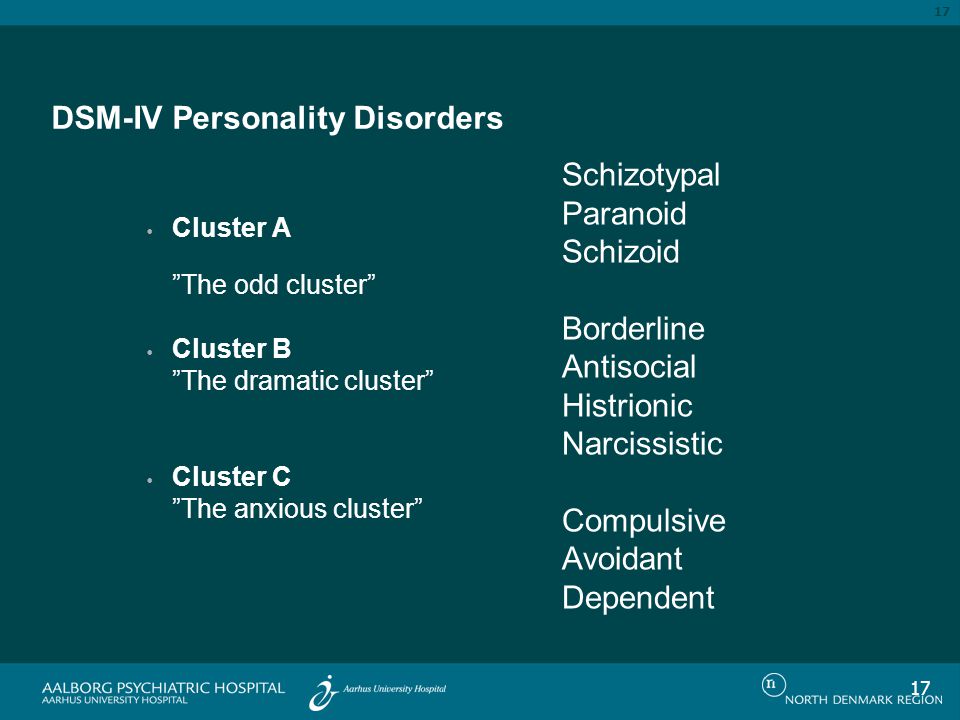 They may use a variety of ways to get attention, often in socially unacceptable situations. This behavior may include:
They may use a variety of ways to get attention, often in socially unacceptable situations. This behavior may include:
- provocative interactions
- theatrics
- false sense of closeness
People with this disorder are at increased risk of suicidal gestures.
Read more: Understanding why people cut themselves, hiding it and how to help »
Narcissistic Personality Disorder
People with this personality disorder believe they are superior to others. Symptoms include:
- extremely negative reaction to criticism
- heightened sense of self-importance
- preoccupation with grandiose thoughts of success
- excessive need for admiration
- strong sense of entitlement
People with this disorder often exhibit a lack of empathy and may use personal relationships to boost their self-esteem.
Causes and risk factors
Personality disorders are likely caused by a combination of genetic and environmental factors.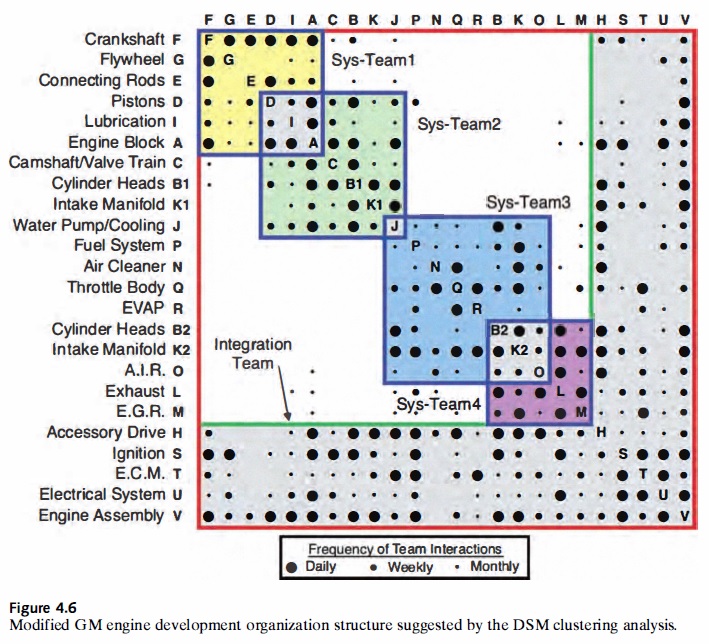
one study found a strong correlation between borderline personality disorder and history of sexual trauma. Another study found an association between children who were verbally abused by their mothers and various personality disorders, including borderline and narcissistic personality disorders.
A recent review also found similarities in the anatomical features of the brains of people with Cluster B personality. This suggests that brain development may also contribute to these disorders.
Research has also found a significant association between cluster B personality disorders and family history. Having a parent or sibling with a personality disorder increases the risk of developing the disorder.
Diagnosis
It is important not to diagnose yourself or others if you see signs of a personality disorder. A personality disorder should only be diagnosed by a qualified mental health professional.
Mental health professionals use the DSM-5 to diagnose personality disorders and other mental health conditions.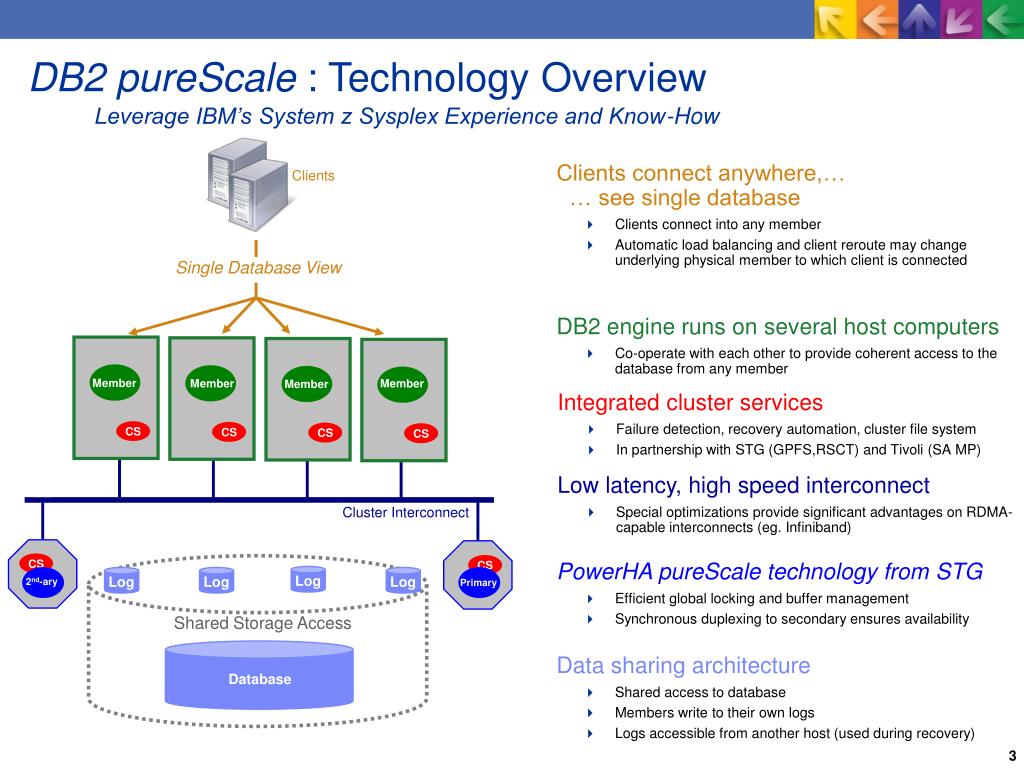 To be diagnosed, people must meet the criteria listed for that specific disorder.
To be diagnosed, people must meet the criteria listed for that specific disorder.
You will most likely have to see a therapist for several sessions before an official diagnosis can be made. During your meetings, they will ask various questions about your life, many of which may seem very personal. It is important to be open and honest with your mental health professional. This will help them make an accurate diagnosis.
According to the DSM-5, you must meet the following requirements to receive a diagnosis of cluster B personality disorder:
- Symptoms first appeared in early adulthood.
- If you are under 18, you must have had symptoms for at least one year.
- Symptoms must not be associated with other disorders or specific stressful situations.
Your doctor may also want to talk to family members to help you understand your symptoms. This is because it can be difficult to recognize the symptoms in oneself. Your doctor will not share what you have told him with your family members, nor will he share with you what your family members have shared.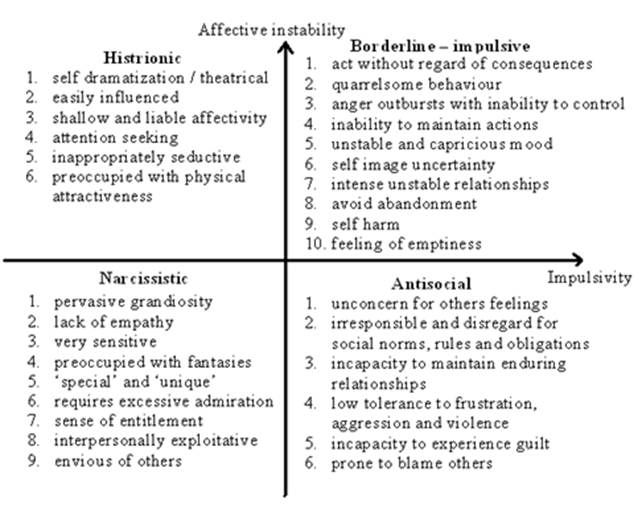
Decision
Treatment is likely to involve a variety of methods and will require commitment on your part. Your doctor may recommend trying something new during your treatment. And you may have to keep seeing your doctor for a long time, even after your symptoms improve.
Psychotherapy
Psychotherapy is usually a key part of any treatment plan. It is also sometimes called talking therapy.
During psychotherapy, you will have the opportunity to express your thoughts and feelings in a nonjudgmental and supportive environment. People with Group B personality disorders may find it difficult to establish a comfortable relationship with a therapist. You should not take this as a sign that the therapy is not working.
Your doctor may also recommend Dialectical Behavior Therapy (DBT) and Cognitive Behavioral Therapy (CBT).
DBT is used to teach new skills and encourage change. It can be group or individual lessons.
CBT focuses on problem solving and teaches skills to identify problematic thoughts and beliefs.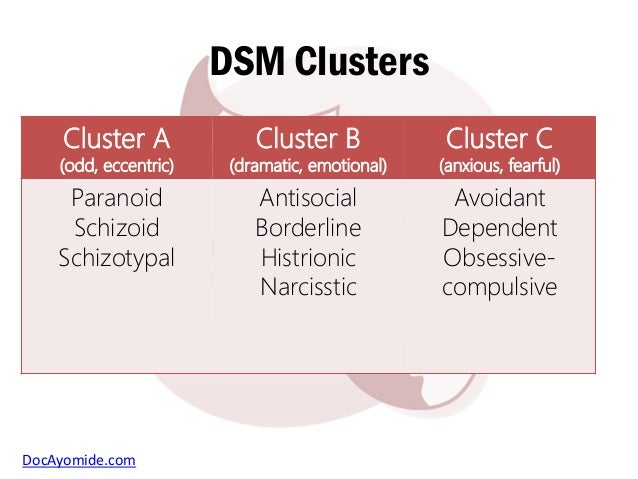
Treatment
There are no drugs approved by the US Food and Drug Administration for the treatment of personality disorders. Some medicines may be helpful if your doctor prescribes them to treat some of your symptoms or treat co-morbid psychiatric or psychiatric disorders. Commonly used medications include:
- mood stabilizers
- antidepressants
- neuroleptics
- anti-anxiety medication
Talk to your doctor about possible side effects and let him know if your symptoms do not improve or worsen. You should also avoid drugs or alcohol while taking these medicines as they may increase the risk of side effects.
Helping a loved one
If a family member or friend has been diagnosed with a personality disorder, be supportive and open. Let them know without judgment when they violate your boundaries. They may not always pick up on social cues, but careful guidance can help them identify behaviors that may be affected by their condition.
If you think a person with group B symptoms is a danger to themselves or others, call your local emergency services.
Outlook
People with cluster B personality disorders often have difficulty maintaining healthy relationships and may exhibit emotional and impulsive symptoms. The condition can be managed with treatment, although you may need a combination of treatments, including therapy and, in some cases, medication.
Suicide Prevention
If you think someone is at immediate risk of harming themselves or harming another:
- Call 911 or your local emergency number.
- Stay with the person until help arrives.
- Remove all weapons, knives, medicines, and other items that could cause harm.
- Listen, but don't judge, argue, threaten or yell.
If you think someone is thinking about suicide, get help from a crisis or suicide prevention hotline. Call the National Suicide Prevention Hotline at 800-273-8255.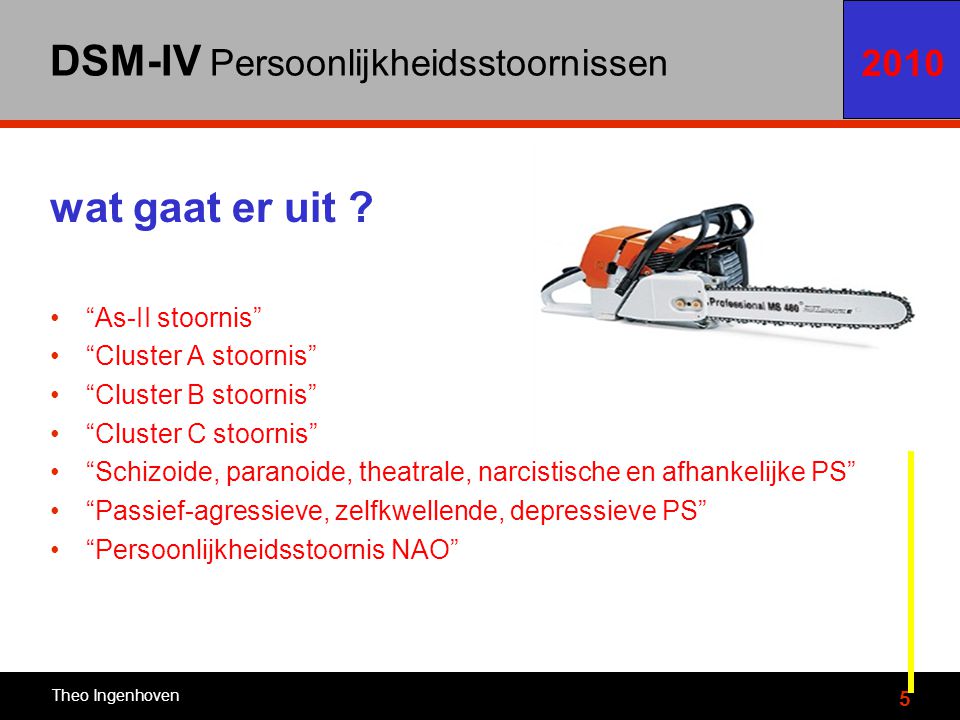
Dsm - IV Groups personality disorders into 3 groups:
- paranoid
- schizoid
- schizotypal
- antisocial
- border
- hysterical
- narcissistic
- avoidant
- dependent
- obsessive-compulsive
DSM – IV 1
Personality disorders
This section begins with a general definition personality disorder, which is applicable for each of the 10 specific disorders. All personality disorders are coded along axis II.
General diagnostic criteria for the disorder personality.
A. Long-term pattern of internal experiences and behavior clearly deviant from cultural expectations. This pattern appears in two (or more) areas of the following:
1 – cognitive sphere (i.e. ways perception or understanding of oneself, others people and current events),
2 - affective sphere (i.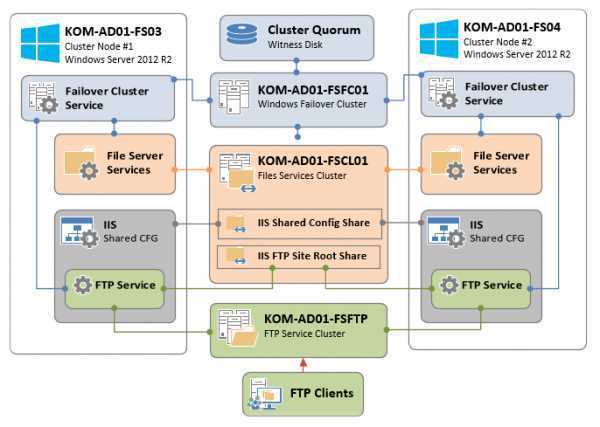 e. range, intensity, lability acceptability emotional reactions),
e. range, intensity, lability acceptability emotional reactions),
3 – interpersonal functioning,
4 - impulse control.
B. This long-term pattern is inflexible and comprehensive in a vast range of personal and social functioning.
C. This pattern leads to overt clinical violations or deterioration in social, professional or other important areas of operation.
D. This pattern is stable and long-term, and its establishment can be traced at least up to adolescence or adolescence.
E. This pattern is not a manifestation or the result of another mental diseases.
F. This pattern is not direct psychological result of the use substances (such as drugs or medications) or general health (e.g. head trauma).
Cluster a.
301.0 Paranoid personality disorder
A. Deep mistrust and suspicion towards others with interpretation motives for their behavior as unfriendly, started in youth and present in a variety of contexts that determined by four (or more) of the following factors:
1- suspicion without sufficient grounds that others exploit, harm or deceive him/her
2- preoccupation with unjustified doubts regarding fidelity or reliability friends or partners
3- unwillingness to reveal to others unjustified fears that the information misused against him/her
4- search for hidden meanings or threatening signs of harmless remarks or events
5- constant ill will, i.